Commentary: What will it take for Singapore to give up plastic?
Ad
Commentary
Commentary: What will it have for Singapore to give up plastic?
Moving away from single-utilize plastic and making clean drinking water available everywhere are two ways nosotros can tackle the scourge of plastic waste here, says 1 observer.
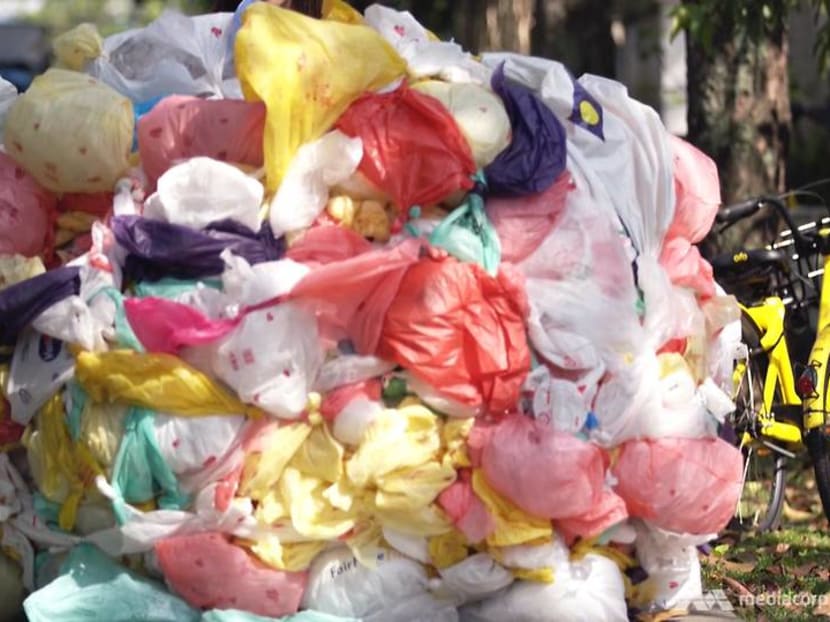
This huge "ball" represents the number of plastic bags Singaporeans throw away every 3 seconds - more than 2,600.
15 Jul 2022 02:02PM (Updated: thirty Apr 2022 04:33PM)
SINGAPORE: Conscientious businesses and early adopters such every bit Plain Vanilla, KFC, Deliveroo, Millennium Hotels and IKEA in reducing single-use plastic waste, should exist applauded for their courage and leadership, and responsible consumers should shift their business concern accordingly.
But the scale of our consumerism – leading to more plastic than fishes in our oceans in 2050, and microplastics from disintegrating plastic waste contaminating our water, food concatenation and us – demands a similarly robust response.
Addressing our plastics problem requires tackling it at its root – the use of plastics, in detail single-utilise plastic. If we do not want to exist nourishing our families with plasticised nutrient and h2o, or take more sea animals die because we "need" straws to drink, and so minimising plastic usage seems logical.
Merely attempting to recycle, amidst this avalanche, is as effective as stopping sea level surges with a vino drinking glass.
Complementing plastic utilize reduction is circular economy design – worth the investment in producing thoughtful, well-made products that stand the exam of fourth dimension, and potentially a sector of opportunity for Singapore going forward.
China'south decision to terminate being the world'southward rubbish dump, resulting in our plastic "recycling" simply getting burnt and taking up limited landfill infinite, should provide further impetus.
READ: The monstrous scale of plastic bag wastage in Singapore, a CNA Insider study
Plastic can exist essential, in express and specific situations, such equally medical purposes and assisted living for the physically challenged. Only the majority of the 9 billion tonnes of plastic e'er created do not stem from essentials.
Rampant and indiscriminate plastic usage does not only hurt or impale body of water creatures; microplastics taint breast milk with which we nourish babies, and even donor organs. Allowing this to go on could mean plastics rather than AI transforming humans in the time to come.

IRRESPONSIBLE BUSINESSES MAY BE RESPONSIBLE
The challenge may be more key - do businesses accept the correct to force club to bear their negative externalities?
Would plastics companies guarantee that microplastics from their products are safe for human or animal consumption?
Privatising profits and socialising costs is a surefire style of escalating the tragedy of the eatables.
Encouraging corporate irresponsibility, ensures that the rest of us – government, civil lodge and responsible businesses – have to invest time and other resource to help corporate babies clean up their ain mess. Obviously, this is not sustainable.
There are innovative ways to collect and fifty-fifty liquefy plastic waste, but should club deport this price?
Beyond plastics, Obike is just 1 of the more public and recent examples of the pain that corporate irresponsibility could cause.
READ: A commentary on oBike's closure, a cautionary tale about poorly conceived business organization ideas
KFC'south movement in particular, seems to take prompted significant attention. Its scale and the siren telephone call of fast food in general, ways an estimated "reduction of 17.8 metric tons of single-use plastics in a year".
McDonald's in dissimilarity, has not extended its UK civil action to supplant plastic straws with paper ones to Singapore. If businesses cannot regulate themselves, it may prompt regulatory action ala the EU.
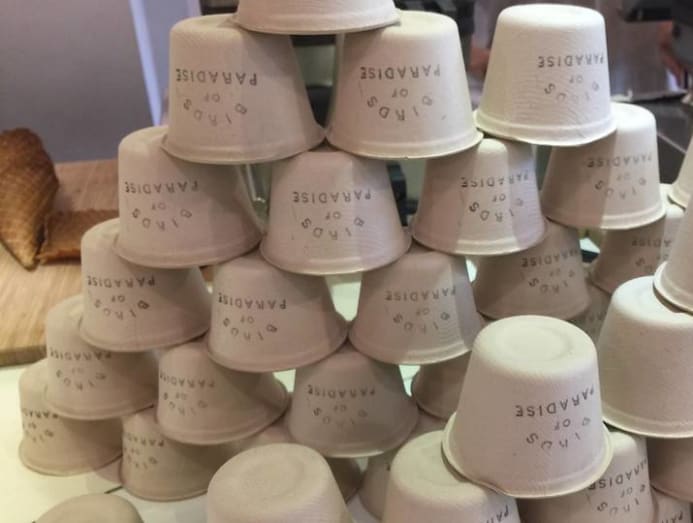
For an advanced nation aware of climate change'south bear upon, why do nosotros still allow caviar ecology standards to muddle through?
HOMEGROWN COMPANIES RISE TO THE Claiming
Forward-thinking modest enterprises such as homegrown Manifestly Vanilla Baker are taking responsibility – and fifty-fifty more holistically. Without a huge public relations budget, information technology is serendipitous that their greenish policies came up in my newsfeed.
They chose not merely to forego plastic straws completely, but bottled water sales too.
Combined with a decent disbelieve to encourage you to bring your own bag and reduce takeaway waste, they might be seen to take taken on some financial risk – though information technology is likely to exist more than first in the medium and long term by increased customer goodwill and business concern.
What heartens me at least equally much is its food waste reduction plan, including importantly, redistribution of unsold food to those in need in Singapore.
READ: To truly make a big cut, go beyond recycling, a commentary
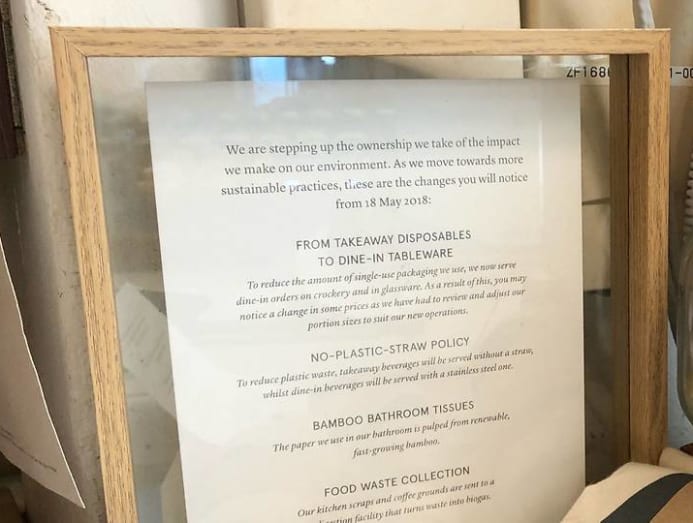
MOVE THE NEEDLE, GIVE THE PUBLIC Pare IN THE GAME
The current war on plastic may have stemmed from the injuries or deaths of body of water creatures, merely the way to motility the needle is for the public to understand their skin in the game.
Usa periodical Scientific discipline notes that 8 one thousand thousand tonnes of plastic are dumped into the earth's water system per yr, with toxic particles ingested by fish and up the food chain.
The Slap-up Pacific Garbage Patch, the largest aggregating of ocean plastic in the world, is only the size of France because the rest have disintegrated. Microplastics taint our food and water; which expert parent wants to feed their children with plastic-laced food?
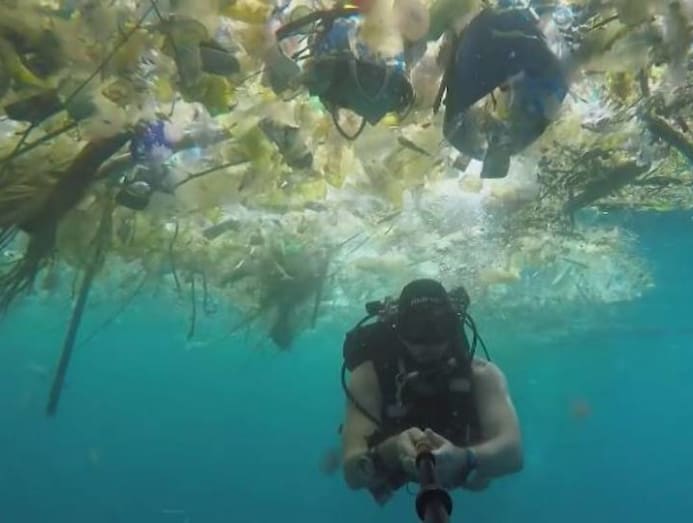
The rising accrual of microplastics and toxins in our bodies should concern policymakers responsible for the well-being of citizens, particularly given Singapore's imperatives of health, fertility and productivity.
We have other major national priorities that demand mental bandwidth, blueprint thinking and other resources, so I hesitate to recommend an all-out strategy to tackle plastic given our bureaucracy of needs. Moreover, the largest part of oceanic plastic waste – fishing nets – does non stem from Singapore. But here are a select few recommendations for thought.
Brand Make clean DRINKING WATER AVAILABLE EVERYWHERE
The most important actions our Government tin take to mitigate the health risks is a focus on water distillation instead of filtration, equally distilled water is complimentary of microplastics.
If micro-filtration to remove microplastics tin can exist deployed at lower costs, that could be a less disruptive and more than desirable way of achieving mass microplastic-free water.
Another significant move we should accept is to raise and advance plans to have water dispensers publicly available, with at least ane in each building, including MRT stations, bus interchanges and malls.
While that is targeted at reducing the demand for sugary drinks, the presence of h2o dispensers reduces the need for the purchase of bottled water, and makes it sensible to carry one'south own.
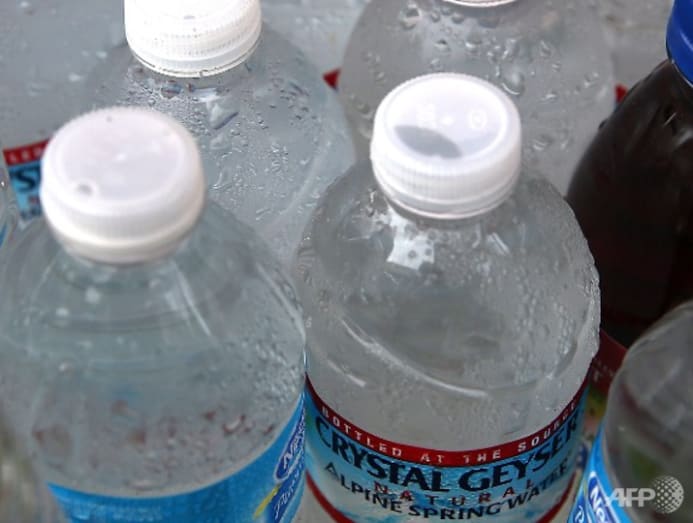
A Whole-of-Regime approach might likewise see Singaporeans apply an app that pinpoints the locations of water dispensers, giving the public balls of admission to drinking water everywhere – a bonus as temperatures soar and keeping hydrated becomes a wellness imperative.
To encourage Singaporeans to be environmentally witting, the same app could highlight F&B outlets that have abolished single-use plastic completely.
A claiming is how to recoup current drinks sellers – be it in malls or in hawker centres. Rental rebates commensurate with bottled water sales, and helping them pivot to healthy drinks by enlisting the help of universities or social impact enthusiasts through hackathons for instance may be some ways.
More than bachelor fresh juices gratis of artificial sugar, are likely in Singapore's health interests and also help raise the profit margins of entrepreneurs versus bottled h2o.
READ: From ditching disposables to composting, the women going the extra mile to reduce waste
STOP USING PLASTIC UTENSILS
Protecting our culinary heritage in hawker centres, would seem to dovetail with serving food in actual plates and utensils, rather than plastic ones, which is not known to be estrus-stable. Many of us accept been concerned with cafes and restaurants serving food in plastic disposables fifty-fifty for dining in.
If this is because of staff costs involved in washing utensils, why not invest in a dishwasher with bulk purchase deals, so that we can have clean utensils that are cheaper in the longer run economically and environmentally?
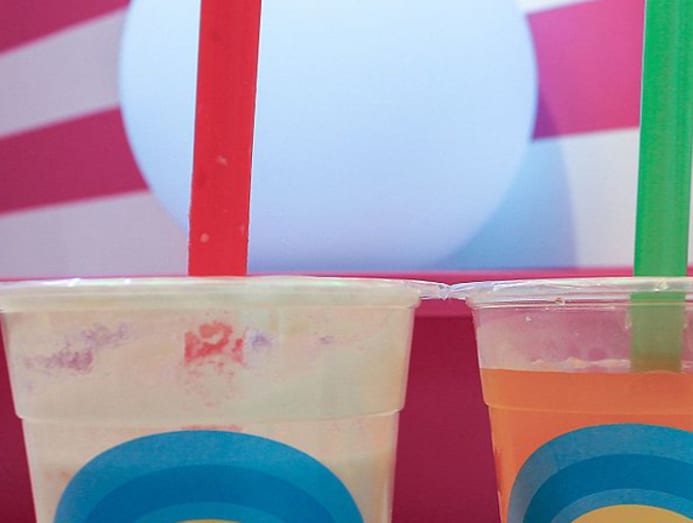
TACKLE SCOURGE OF PLASTIC USE
There is much that can be done to tackle the scourge of plastic use in our function of the globe.
Five Asian countries – China, Indonesia, the Philippines, Vietnam and Thailand - account for 60 per cent of plastic waste leaking into the bounding main, co-ordinate to Ocean Conservancy and the McKinsey Eye for Business organization and Surroundings.
Singapore could leverage its Asean Chairmanship – in its Twelvemonth of Climate Activity – on evaluating and building the instance for the minimising of plastics for our greater skilful, across plastic to climate activity overall, and across the plastic sector to the entire corporate sector.
Vivian Claire Liew is founding CEO of social enterprise PhilanthropyWorks and a Young Global Leader of the Globe Economic Forum.
Recent Searches
Trending Topics
Source: https://cnalifestyle.channelnewsasia.com/commentary/commentary-what-will-it-take-singapore-give-plastic-300031

0 Response to "Commentary: What will it take for Singapore to give up plastic?"
Post a Comment